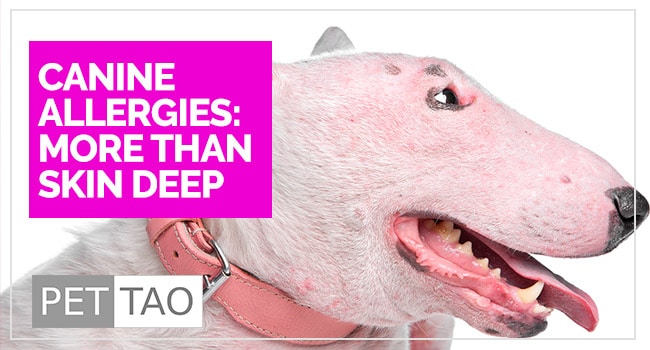Handy Advice For Selecting Dog Skin Allergy Treatment
Handy Advice For Selecting Dog Skin Allergy Treatment
Blog Article
What Can Probiotics Do To Help Allergies To The Skin In Dogs And Cats?
Probiotics may play an important part in controlling and relieving allergies to the skin in both cats and dogs. The beneficial bacteria help to maintain the gut microbiome, which in turn, supports the immune system and skin. Probiotics are a great way to treat skin allergies in dogs:
Immune System Regulation
Balanced Immune Reaction:
Function: By promoting beneficial bacteria growth and inhibiting harmful bacterial growth in the gut, probiotics aid in regulating the immune system.
Benefits An immune system that is healthy helps reduce hypersensitivity reactions, which could lead to skin allergic. This helps in minimizing the severity and frequency of allergic reactions in pets.
Inflammation Reduction
Anti-inflammatory Effects:
Function: Some strains of Probiotics may reduce inflammation and release antiinflammatory chemicals.
Benefits: Lowering inflammation in the system can lessen the inflammation and itching that can be associated with skin allergies and result in a healthier and more youthful skin.
Gut-Skin Axis
Improved Gut Health:
Function: The gut's surface Axis is a reference to the relationship between gut health and skincare health. Probiotics enhance gut barrier function and are essential for digestion health.
Healthier guts help prevent the leeching of toxins into the bloodstream which can cause allergic reactions to the skin. It also helps reduce the symptoms of skin allergy.
Strengthening Skin Barrier
Improved Skin Barrier
Function: Probiotics have the ability to influence the distribution and production of ceramides, as well as other lipids essential for maintaining an effective skin barrier.
Benefits: The skin barrier is strengthened. It can reduce the risk of skin allergies, infections and other skin ailments.
Allergy Symptom Management
Treat Symptoms
Function: Probiotics are able to alleviate symptoms through the modulation of release of histamines, as well with other chemicals that are that are involved in allergic reactions.
Benefits: It reduces the irritation, itching and discomfort that can be caused by skin allergies in pets.
The Enhanced Diversity of Microorganisms
More Microbial Diversity
Function: Probiotics increase the diversity of the gut microbiome which is essential for a balanced immune response.
Benefits A microbial community that is diverse improves overall health and skin health by stopping the growth of bacteria that can trigger allergies.
Certain Probiotic strains
Lactobacillus (common probiotic strain) and Bifidobacterium (common probiotic strain) Probiotics that are commonly used are effective in treating allergies to skin in pets.
Lactobacillus Rhamnosus GG: It is renowned for its ability to improve gut health and reducing the symptoms of allergies.
Bifidobacterium animals: Helps to reduce inflammation and improves the immune system.
Use Considerations
Dosage: The dosage of probiotics will be determined by the size of your pet's body, weight, and the requirements for health of your pet. Follow the instructions on the package or that your veterinarian will provide.
Formulations Probiotics can be found in a variety of forms for pets like capsules, powders and chews. It's important to choose an excellent, pet-specific brand to ensure safety and efficacy.
Monitoring and Side effects While probiotics are safe generally, it is essential to watch your pet for reactions that could cause stomach upset. It is possible to reduce the risk of side effects by starting at a smaller dose and then gradually increasing the dose.
The article's conclusion is:
Probiotics can assist treat skin allergies in cats and dogs by improving digestion, controlling the immune system, and decreasing inflammation. Regular consumption of probiotics will lessen the signs of allergy. It can also promote healthier skin in pets and cats as well. See the top rated killer deal for blog recommendations including pet digestive supplements, pet plant protein supplements, pet supplements for pets with fear of medication, pet cognitive supplements, natural pet food, pet boswellia supplements, dog supplements, pet digestive supplements and more.
Astragalus Helps To Prevent And Treat Kidney Failure In Both Cat And Dog.
Astragalus is a plant that has been utilized for its use in Chinese traditional medicine for centuries. Its immunomodulatory, anti-inflammatory and antioxidant properties have shown to aid in the treatment of kidney disease in both dogs and cats. Astragalus may help in a number of ways.
Anti-inflammatory properties
Reduction of Inflammation:
Astragalus is one of the plants that is rich in flavonoids and saponins. These substances have anti-inflammatory properties.
Benefits In reducing inflammation, you can slow down kidney damage progression and lessen the symptoms. Additionally, you will increase kidney function.
Antioxidant Effects
Reduced Oxidative Stress
Function: Astragalus contains powerful antioxidant properties that neutralize free radicals, which can cause cellular damage.
Benefits By reducing the oxidative damage, Astragalus helps improve kidney function. It also helps slow disease progress.
Immunomodulation
Immune System Support:
The function: Astragalus modulates the immune system, enhancing its ability to fight infections as well as reduce autoimmunity.
Benefits An immune system that is healthy helps to prevent infections, and helps to reduce autoimmune reactions that can cause kidney damage.
Improvement of Kidney Function
Enhancement Glomerular Filtration :
Function: Some studies indicate that Astragalus can enhance kidney function by increasing the rate of glomerular filtering which is the speed that kidneys purify blood.
Benefits: A stronger filtration process can help kidneys to remove waste with greater efficiency, thus reducing the symptoms of kidney disease. It also improves overall health.
Anti-fibrotic Effects
Prevention of Kidney Fibrosis:
Astragalus has anti-fibrotic qualities that help to prevent the growth and accumulation of scar tissue around the kidneys.
Benefits: Reducing fibrosis helps keep the kidneys in good shape essential to maintain kidney function in pets with chronic kidney disease.
Cardiovascular Support
Help for Cardiovascular Health
Function: Astragalus can help improve cardiovascular health by supporting healthy blood pressure and heart function.
Benefits: Improved cardiovascular health improves the overall well-being and health of pets, especially those with kidney disease.
Diuretic Effects
Urine Flow Promotion:
Astragalus may have a slight diuretic effect that increases urine flow and promoting excretion.
Benefits: Improved urine flow supports kidney health by eliminating toxins, balancing fluids and regulating fluids.
Questions and Use
Dosage Administration, Dosage Amount of Astragalus to administer depends on the weight, size, and health condition of your pet. Consultation with your vet is crucial, since they will be able to guide you in the right dosage and type of Astragalus best for your pet (e.g. capsules, tinctures, powder).
To ensure safety and efficacy, use high-quality Astragalus supplements that are standard. Specially designed products for pets are the best.
Astragalus can cause gastrointestinal upset in some pets. By starting with a low dosage and gradually increasing it and gradually, you can reduce the chance of adverse negative effects. It is important to ensure that a veterinarian is monitoring your pet regularly to see how they respond to the medication. If needed it is possible to have the dosage modified.
Conclusion
Astragalus can be beneficial in managing kidney failure among dogs and cats. Its antiinflammatory, antioxidative immune-modulatory, anti-fibrotic and immunomodulatory effects can help improve kidney health and function. Regular use of Astragalus under the guidance of a vet, can reduce the development of kidney disease, enhance quality of life, and boost the health of pets with kidney failure. Follow the top rated on the main page for dogs supplements for website recommendations including pet nutrition supplements, pet omega-3 supplements, pet wellbeing cushings care kit, pet skin and coat care, natural pet supplements, pet supplements for pets with fear of collars and harnesses, pet supplements for pets with fear of collars and harnesses, pet bromelain supplements and more.
Apple Cider Vinegar Helps With Yeast Infections For Cats And Dogs.
ACV can be used as a treatment for yeast infections in cats and dogs. ACV may have some benefits however, despite the anecdotal evidence and studies that show the use of ACV is beneficial, it should be administered under the supervision of a veterinarian due to ACV's acidic properties and side effects. ACV can help treat yeast infections.
Antifungal Properties
Acidic Environment
ACV is acidic, with an average pH of 2.5 to 3. This acidic pH may hinder yeast growth.
Benefits: Applying ACV topically on your pet or adding it in their bath water can in reducing the growth of yeast on their skin.
Skin pH regulation
Balancing Skin pH:
ACV can help to regulate the pH levels of your skin. This will help to maintain an overall healthy skin barrier and prevent yeast growth.
Benefits: Keeping a healthy pH levels in the skin will aid in preventing yeast infections, as well as improve overall skin health.
Anti-inflammatory effects
The reduction of inflammation
ACV contains mild anti-inflammatory properties.
Benefits: Reducing inflammation can help alleviate symptoms such as redness, itching, and discomfort that are associated with yeast infections.
Support for Digestive Health
Internal Use
ACV's function is to improve digestive health by balancing intestinal flora in extremely low doses, and in extremely diluted forms.
Benefits of a more healthy gut environment: By enhancing immunity and microbial balance, a healthier environment in the gut can help limit the overgrowth of yeast.
Use and Considerations
Topical Application - dilute ACV (typically 1 part of ACV for every 2 parts water) by adding water. Apply as a rinse, spray, or ointment on affected areas. Do not apply it to wounds that are open or on the skin.
Consult a vet before considering any internal use. ACV is best administered in small quantities and diluted (1 1 teaspoon to 1 tablespoon for every cup of liquid) to prevent any stomach upset.
Monitoring: Check for signs of allergic reactions or irritation during the use of ACV topically. If you experience any negative reactions, discontinue using ACV.
Consultation with Veterinarian: It's crucial to consult with a vet prior to making use of ACV for yeast-related infections in animals. They can offer advice on proper dilution techniques, methods of application, and possible risks based on your pet's specific health requirements.
Also, you can read our conclusion.
While apple cider can have certain benefits when it comes to managing yeast infections in dogs as well as cats however, use of this vinegar should be carried out under the supervision of your veterinarian and with cautiousness. ACV is acidic, and could create an environment that doesn't encourage yeast growth. It may also have moderate anti-inflammatory effects. However, dilution is essential and so is careful application to avoid irritation. ACV can be utilized effectively and safely by following veterinary guidance as a part of a comprehensive treatment plan to treat yeast diseases in dogs. View the most popular from this source about dogs supplements for blog recommendations including pet joint supplements, pet supplements for pets with spinal problems, pet supplements for pets with fear of elevators and escalators, pet supplements for pets with joint stiffness, pet milk thistle supplements, pet supplements for pets with brittle nails, pet supplements for pets with fear of muzzles, pet supplements for pets with fear of illness and more.